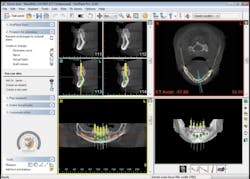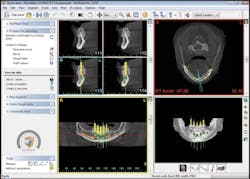My latest WOW moment!
By Mark E. Hyman DDS, MAGD
The moment came when a colleague told me: "I have no interest in talking patients into putting their 401(k) into restorations."
For more on this topic, go to www.dentaleconomics.com and search using the following key words: feedback, WOW moment, 401(k), communication, rights, Dr. Mark Hyman.
As I travel around the country addressing national and state dental conferences as a continuing education speaker, I continue to learn from the dentists who attend my sessions through their feedback. I review my ratings with great interest, but it is usually the anonymous comments that catch my attention. The fact that these dental professionals took the time to do more than check a number, and were motivated to express opinions on my presentation compels me to read each comment carefully and often consider them for weeks.
Sometimes, if a comment is not anonymous, I will contact the writer to discuss the comment with him or her, whether it is positive, negative, or simply inquisitive. One critical comment came to me recently from a seminar I presented earlier this summer. It was astounding.
I couldn't get my mind around how a dentist could hold the belief he had communicated in his statement. Rather than respond in my mind to this person, I have chosen to address his comment in print.
He wrote, "I have no interest in talking patients into putting their 401(k) into restorations." To paraphrase Denzel Washington in the movie "Philadelphia," "Can someone explain this to me ... like I'm a six-year-old child?"
First, what part of my presentation provoked such a statement? In retrospect, I don't think it was one particular item, but the general message shared in each of my presentations.
It can be simply stated as, "Your patients deserve the best dental care you can give them. It is your responsibility to educate them – without making any prejudgments based upon their age, background, or financial status – about how they can enjoy optimal dental health and have the brightest smile possible."
This dentist's comment leads me to believe that he thinks we're doing a disservice to our patients by giving them the facts they need to make an informed decision. The statement claims that whatever amount of money a patient "saves" by not investing in oral health is better used elsewhere, and apparently for older patients, to fund their retirement.
Feedback welcome
I have been on the speaking circuit since 1989, and have had the privilege of comparing notes with so many colleagues through the years. We all welcome feedback, and always hope to influence, challenge, provoke, motivate, liberate, and inspire our audiences. I can humbly admit, the feedback and thoughtful letters, phone calls, and e-mails that I receive after every seminar convince me that I am delivering on that promise. And yet, the above critique sent me reeling.
I wish that I had the opportunity to sit down with this doctor and ask, "What happened during your training, in your practice, or in your career that caused you to have low self-esteem, or the limited beliefs that this statement reflects? Do you not recognize and value the magnificent care dentists can provide for our patients? Who planted the seeds of doubt so that you deny patients your very best?"
This dentist is letting himself and his team down, and providing his patients with less than optimal care. He is probably not giving them the option to decide for themselves what value they place on their oral health.
The irony of this situation is that while these patients may not be offered the option for a porcelain crown or teeth whitening procedure by this dentist, they would likely be the first ones to accept treatment offered by another dentist who takes the time to find out what they want for their oral health.
By explaining the positive changes possible through today's advanced technology– procedures that the patients may be completely unaware of due to the limitations of their former dentist – their new dentist will earn their trust, and they will have confidence that the treatment plans recommended are crucial to their oral health.
Communicate with patients
The key to achieving this successful outcome is a consistently high level of patient communication. To support this objective, I spend at least 30 minutes with every new patient to find out their dental history, medical condition, expectations for the practice, and aspirations for their oral health. I also find out why they left their old dentist.
Often, the fact that they were not given enough information to make an informed choice about their dental care is cited as a reason for their dissatisfaction. They are usually quite surprised that I take this time so early in our relationship, but I find that this consultation provides valuable information that helps build loyalty that lasts for a lifetime.
Paraphrasing the late Dr. Harold Wirth, "People will buy what they value, they will buy what they want, but not necessarily what they need." The doctor who doesn't think his patients should invest in oral health isn't giving them the opportunity to understand what they need, value what they need, or create what they want.
Why does this doctor use a retirement account as the example of an investment better than oral health? Is it because he believes older patients don't need it?
Bill Novelli said people turning 50 today have more than half of their adult life ahead of them. Don't they have the right to enjoy this time of their lives with a healthy, beautiful smile?
To imply otherwise seems like ageism. It is prejudice similar to that of not offering someone dental care because they are from another country, appear to be of lower income, or don't meet some other arbitrary criteria.
Why would we limit the options we offer our patients, especially when the technological advances – from the one-office visit restorations available through the CEREC, to the incontrovertible evidence of the intraoral camera, to the 10 shades whiter in an hour ZOOM treatment – can impact their oral health and smiles so completely and conveniently? Why would we limit the potential of our practice in this way?
Dentists have rights, but ...
In summary, my response to the anonymous doctor who challenged my presentation, and apparently took issue with my photos of happy patients (admittedly, several of them were seniors), is simply this – all dentists have the opportunity and right to manage their practice the way they choose. However, attendance at a continuing education session implies that you understand the value of enhancing your skills. Are you not enhancing those skills to benefit all your patients, and ultimately, increase the profitability of your practice?
Until you release your preconceived notions about what patients want, and take the time to listen and make the wonders of our exciting technology accessible to every single one, you are limiting the success of your practice. On the other hand, you are giving the dentists who promote optimal oral health to each and every patient a wonderful opportunity to satisfy these patients.
While we all hope that our older patients benefit from robust retirement accounts, most of us also believe they have the right to make their own decisions about how to invest their financial resources. Optimal oral health and brighter smiles might just be their preference when actually given the choice!
Mark E. Hyman, DDS, MAGD, a native of Greensboro, N.C., is in full-time practice, is a dental speaker, and is an adjunct associate professor at the UNC School of Dentistry You may reach Dr. Hyman at [email protected].
Past DE Issues

